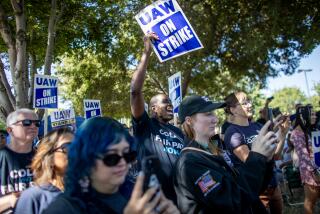45,000 Postal Workers in Canada Strike
- Share via
TORONTO — In the middle of what should have been their busiest season, Canada’s 45,000 postal workers began a long-anticipated strike Wednesday over job security and restructuring.
The strike spread across nine cities, including Toronto and Montreal, in protest of the planned layoffs of thousands of letter carriers and mail clerks. In response, Canada Post Corp. announced it would lock out workers nationwide.
Fear of service interruption had already cut mail volume by half, from 20 million items daily. Postal officials would not say how much of that passes to or from the United States.
Spokeswoman Ida Irwin said the federal mail service has been losing $7 million a day because of low volume and had no choice but to reduce staff to fit the workload.
Darrell Tingley, president of the Canadian Union of Postal Workers, authorized members to strike. Although talks resumed Wednesday evening, workers will stay out until the issues are resolved, he said.
“We’re prepared to strike as long as it takes to get a contract that eliminates rollbacks,” he told a news conference.
In the months since the union contract ended July 31, customers have turned to alternatives--from express parcel service to electronic mail--or have begun hand delivery of bills and Christmas cards. Some of that business may be lost permanently.
John Gustavson, president of the Canadian Direct Marketing Assn., said those hit hardest will be mail-order companies, publications and charities that depend on pre-Christmas fund-raising campaigns.
In anticipation of the strike, catalog clothing company Lands’ End switched delivery for Canadian customers from the post office to a courier service this month.
L.L. Bean of Maine is recommending that Canadians ordering outdoor clothing from its catalog pay for priority mail or Federal Express delivery. Four-fifths of its orders come by telephone, the rest by mail. Bean’s international sales reached $177 million last year.
Calls to United Parcel Service of America in Toronto were up 45% as the strike approached. UPS spokeswoman Susan Bortot said the company’s additional holiday staff will fill some of the demand.
“But couriers are not a replacement for the mail,” she said. “We use the mail service, as well, for sending our invoices.”
Canada Post and the union, which have been negotiating since April, were far apart on issues of job security, restructuring, wage increases and budget cuts. Their Saturday meeting lasted just three minutes, and a Tuesday night encounter among negotiators ended in a scuffle.
The union charges that the company’s reorganization plan, which seeks to cut $150,000 million over five years, would result in the elimination of 4,000 jobs.
Union spokesman Chris Lawson said demands for a wage increase of 8.6% over 18 months would take a back seat to concerns about job security.
The company reportedly offered a 3% wage increase over two years. Union leaders fear that the government will privatize the post office.
The union will deliver pension checks, child benefits and other social payments. Canada Post said it will not attempt to use management to deliver the mail as it did during the violent 1987 and 1991 strikes.
The Canadian Federation of Independent Businesses called on the government to end the strike quickly. Parliament can pass legislation sending postal workers back to their routes, as it did two days after the 1991 strike.
More to Read
Sign up for Essential California
The most important California stories and recommendations in your inbox every morning.
You may occasionally receive promotional content from the Los Angeles Times.










